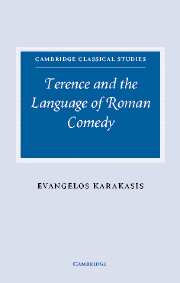Book contents
- Frontmatter
- Contents
- Acknowledgements
- Conspectus siglorum
- Introduction
- Part I Linguistic differentiation in Terence
- Part II Linguistic and stylistic unity in Roman comedy
- Introduction
- 8 Terence, Plautus and the palliata
- 9 Terence, Plautus and the togata
- 10 Terence, Plautus and the atellana
- Bibliography
- Index locorum
- Index nominum et rerum
9 - Terence, Plautus and the togata
Published online by Cambridge University Press: 22 September 2009
- Frontmatter
- Contents
- Acknowledgements
- Conspectus siglorum
- Introduction
- Part I Linguistic differentiation in Terence
- Part II Linguistic and stylistic unity in Roman comedy
- Introduction
- 8 Terence, Plautus and the palliata
- 9 Terence, Plautus and the togata
- 10 Terence, Plautus and the atellana
- Bibliography
- Index locorum
- Index nominum et rerum
Summary
Afranius
Afranius flourished during the second half of the second century BC. Velleius Paterculus dates him in the time of Scipio Aemilianus, Laelius, M. Antonius and L. Crassus, 2.9.3 clara etiam per idem aevi spatium (quo fuerunt Scipio Aemilianus, Laelius, M. Antonius, L. Crassus aliique oratores excellentes) fuere ingenia, in togatis Afranii, in tragoediis Pacuvii atque Acci, and Cicero in Brut. 167 remarks that Afranius tried to imitate the orator C. Titius, who flourished in the last third of the second century BC.
It is indeed true that in the extant lines of Afranius' work (we possess 43 titles and 300 fragments) we come across some well-known Terentian techniques, for example the use of the prologue for responding aggressively to negative critiques (e.g. the prologue of Compitalia). From the point of view of language, however, it seems that Afranius opts to follow the traditional linguistic line of Naevius, Caecilius, Ennius, but above all Plautus, rather than that of the innovative Terence.
Bagnolini (1977) has already pointed out that the language of Afranius is closer to Plautus than to Terence; she does not, however, offer a comprehensive linguistic survey and is unable to show Terence's linguistic place in relation to both Plautus and Afranius. She restricts herself mainly to lexical options, failing to give a full account of the range of linguistic features involved in such a comparative analysis, and, what is more, she does not classify her findings according to their specific EL–archaising, colloquial, or unclassical character etc., being thus unable to prove Terence's adherence to CL rules in contrast to all other comic dramatists.
- Type
- Chapter
- Information
- Terence and the Language of Roman Comedy , pp. 204 - 233Publisher: Cambridge University PressPrint publication year: 2005



